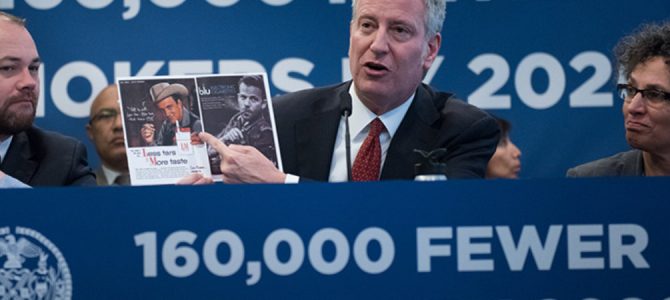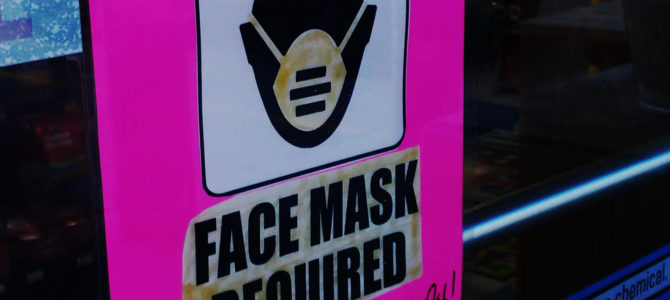New York City Mayor Bill de Blasio announced this week that he wants to raise the base price for a pack of cigarettes to $13 in NYC, making for the highest-taxed cigarettes in the country.
“When it comes to New Yorkers’ health, big tobacco is public enemy number one,” de Blasio explained during an anti-smoking event in the city. “These companies have used the same playbook for decades, and we can no longer sit by while the next generation becomes addicted.”
On top of a new tax, de Blasio also supports treating e-cigarettes in the same way regulations treat tobacco.
“The e-cigarette industry is becoming the tobacco industry” he tweeted. “That’s why we’ll have them licensed the same way as cigarette retailers.” This isn’t only anti-science and anti-common sense, but counterproductive for many of the people the mayor is supposedly trying to save. Thousands of New Yorkers vape to help them quit tobacco. Other vape because they enjoy it.
What business is it of de Blasio’s to regulate legal activities adults engage in, anyway? The state claims it has an interest in protecting public health, so it bans smoking in restaurants and public spaces. Those bans were attacks on private property and consumer choice, but people capitulated to this kind of intrusion long ago for the sake of convenience. The majority of Americans simply aren’t sympathetic to smokers’ cause.
But “sin taxes,” as the moniker implies, are policies that penalize Americans for conducting their private lives in ways that public officials disfavor. It’s one thing to demand transparency, and another to compel people to live salubrious lives. This kind of paternalism distorts the role of government by trying to protect adults from their free will.
Anyway, if big tobacco really is “public enemy number one,” and the purpose of inflating the price of a pack of cigarettes is to compel us to make better life choices, why not hike a pack to $20 — or $500, for that matter? Why would de Blasio allow tobacco to menace his constituents when he could make a difference? Shameful.
There are 29 times more tobacco sellers than Starbucks in New York City. We’re going to be going after licensing and capping that.
— Bill de Blasio (@NYCMayor) April 19, 2017
One might even wonder why de Blasio isn’t worried that there are more Starbucks than Whole Foods in New York, considering the coffee chain sells millions of high-calorie, sugar-loaded unicorn frappuccinos that are making New Yorkers fat and clogging their arteries. There is a “diabetes epidemic” in New York, you know. Probably because Starbucks isn’t frequented by the poor, and sin taxes are, of course, regressive.
Anyway, there’s another, far-less discussed problem inherent in this kind of social engineering. Dumb laws that aim to micromanage the lives of citizens not only create black markets, they can get people killed over the most innocuous actions.
You will remember Eric Garner, the man killed by police officers when he was put in a chokehold during an arrest for selling ten-cent loose cigarettes. No, Garner wasn’t targeted for death because he was avoiding taxes, but nonetheless prohibitive laws like sin taxes — laws that do nothing to make people safer — lead to a spike in inane interactions between the police and citizens.
When Garner’s death was ruled a homicide, de Blasio conceded that selling “loosies” was nothing but a “minor offense.” Yet the very same week he was directing his staff to launch multi-million racketeering suits against states that don’t practice his brand of soft authoritarianism. (In 2016, the city joined a suit against UPS, demanding that the delivery company pay more than $872 billion for making illegal deliveries.) Not long before Garner’s death, Gov. Andrew Cuomo formed a “Cigarette Strike Force” to crack down on tobacco trafficking. On numerous occasions cops have claimed that they treat cigarette trafficking “the same way they would a narcotics investigation.” So it’s a War on Drugs aimed at legal substances.
Around a million people in New York City are still smokers, and many people smoke occasionally. According to one study, nearly 60 percent of the cigarettes bought in New York are now “smuggled” into the city. The National Research Council says smuggling cigarettes into New York is more lucrative for some states than smuggling uncut cocaine.
You can imagine what artificially hiking cigarette prices to $13 a pack will do for this situation. De facto prohibition, which is the long-term goal of the de Blasios of the world, creates lawbreaking. It diverts resources from genuine problems that plague big cities. It’s just another example of the progressive impulse to control the lives of constituents. And if de Blasio wants New York to treat vaping in the way it does smoking, it means he wants New York to criminalize that habit, as well.








